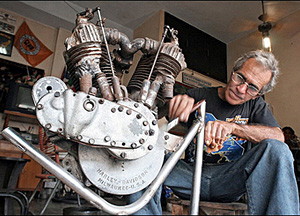 |
 |
 |
 Business News | February 2007 Business News | February 2007  
US Economic War Costs Cuba 86 Billion Dollars
 Alfredo Boada - Prensa Latina Alfredo Boada - Prensa Latina


| | The most experienced mechanic for Harley-Davidsons in Cuba, Sergio Morales, checks an F-Head V-Twin motor, in his garage in the Luyano neighborhood of Havana in 2005. Unable to get original parts because of a 45-year-old US embargo, Harley-Davidson aficionados resort to ingenuity and Soviet truck parts to keep the decades-old US classics on Cuban roads. (Adalberto Roque/AFP) |
US President John F. Kennedy, penned on February 3, 1962 presidential decree 3447, making the blockade on Cuba official, in an economic war already costing the island 86 billion dollars.

Since 1959, Washington undermined vital sectors of the Cuban economy as the suspension of the sugar quota, main support to the island and the cut of oil supplies and the refining industry as well as the boycott on spare parts acquisition for the Cuban industry.

As early as February 12, 1959, the US decided not to return 424 million dollars of Cuban National Bank reserves robbed by members of the Batista dictatorship. The revolutionary movement lead by Fidel Castro started to apply measures to defend the country´s population.

Those actions to recover the country´s wealth for the people hit big US monopolies which for more than half a century plundered and dominated the Cuban nation.

The White House sanctions aimed to vanquish the Revolution came rolling one after the other until turning this into the longest and most cruel blockade in history.

Washington snatched the Cuban sugar quota to the US market in March, 1960. In June, oil firms were prompted to cut fuel supplies to paralyze the nation. US refineries in the island denied to refine crude imported from the ex Soviet Union and the revolutionary government had to confiscate the refineries.

When then president Dwight D. Eisenhower decided to cancel 700 thousand tons pending of delivery from that year´s sugar quota, Cuba responded with the nationalization of US companies established in the country, including 36 sugar plants.

Washington intentions were clearly expressed in a State Department document on April 6, 1960. "Alienate domestic support through disappointment based on insatisfaction due to economic hardships, aimed to cause hunger, desperation and the overthrow of the government."

Secretary of State Christian Herter himself defined such actions as "economic war."

On September, 1960, the US pressured to eliminate credits to Cuban banks and interfere in Cuba´s foreign trade.

Further US sanctions were answered by Cuba on October, 1960 by nationalizing the rest of US properties in the country.

Diplomatic relations were severed by Washington on January 3, 1961 and in March of that year it totally cancelled the sugar quota for about three million tons.

President Kennedy signed the Presidential Proclaim 3447, in line with this hostile action, and the Proclaim started in force on February 7, 1962.

Kennedy ordered the US Secretary of Treasure to promulgate measures and regulations to forbid Cuban import of products, or import operations from Cuba or even through Cuba.

He also ordered the US Secretary of Trade to continue and reinforce prohibition of US export operations to Cuba.

The White House promoted Cuba's political isolation and carried out the mercenary invasion of Bay of Pigs, defeated by the Cuban people in less than 72 hours.

Washington dictated the Regulation for Control of Cuban Actives in 1963, which forbid every Cuban transaction, froze Cuban values in US of all kinds and the trade of subsidiary enterprises in third countries.

Many decrees, regulations and emends, including the Torricelli and Helms-Burton Acts and so-called Bush Plan have hardened the blockade to Cuba to limits over the boundaries of international rights.

Since 1992, the UN General Assembly approves a resolution demanding the US government to end the blockade against Cuba with a growing majority.

In 2006, it obtained a favourable record of 183 countries in favour, with 4 against and just one abstention. | 
 | |
 |



